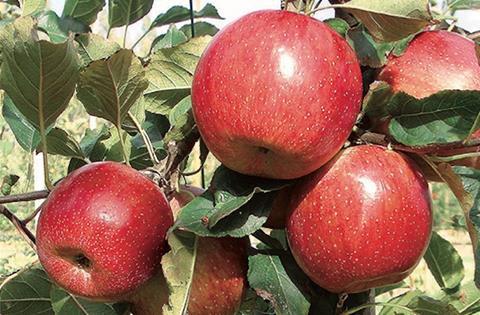
A total of six new apple varieties described by their breeders as ‘eco-sustainable’ have entered full commercial production following a series of trials and in-market tests to gauge their potential, both in terms of productivity and consumer reaction.
Fujion, Fuji San-CIV and Sweet Resistants, a group of four new apple types called Gaia, Gemini, Renoir and Smeralda, are all said to offer excellent organoleptic qualities and a natural resistance to scab. As such, they are expected to offer strong competition in the market for the more traditional, established varieties.
Marica Soattin is general director of the group responsible for breeding the varieties, Consorzio Italiano Vivaisti (CIV). Comprising Mazzoni Vivai, Salvi Vivai and Tagliani Vivai, three of Italy’s leading fruit breeders, the consortium’s aim has been to provide the apple business with something altogether more attractive, both at the point of sale and further back along the supply chain.
Fujion and San-CIV, for example, both have the kind of intense red skin colour increasingly sought after in a number of international markets. The former has clear striations on its surface, while the latter is described as being particularly suited to achieving good colour in growing areas that don’t normally offer the low temperature range necessary.
“These are varieties with innovative characteristics that able to meet different requirements both in terms of the fruit’s properties and its ripening time,” she explains. What’s more, she says, they can be produced in different environments and provide the same quality as traditional cultivars.
“Compared with standard varieties, these plants offer sustained high productivity and they are a lot easier to manage, thanks to the tree’s open structure of short or naturally bending branches. That means harvesting [can be carried out] in few stages.”
Combined with a resistance to scab, the impact of these stronger varieties is a reduced workload for the grower and, by extension, for the environment. “These ‘eco-sustainable’ varieties have come through the experimental phase brilliantly,” Soattin notes.
“Consumers have been fully involved in several panel tests and growers are now into full production of both conventional and organic fruit.”
Pier Filippo Tagliani, present of CIV, says the bar continues to be set high when it comes to bringing new varieties to the apple category: “We are always aiming for the maximum environmental sustainability with varieties characterised by the plants’ natural hardiness and vigour, an ability to adapt to integrated production of both organic and obviously conventional at a high level of productivity, production with a low enviromental impact thanks to disease resistance, and optimum-quality fruit with a distinctive flavour, consistency and excellent shelf-life.”



